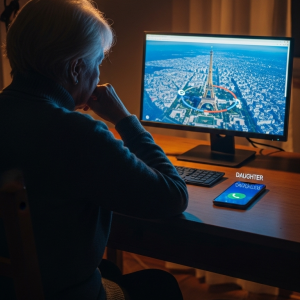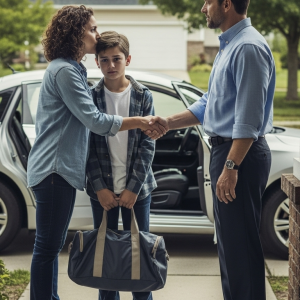My name is Michael, I’m 33, and until recently, I was engaged to a woman named Lydia.
My mother, Patricia, was the best person I’ve ever known. She passed away two years ago after a brutal battle with cancer, but she taught me everything about kindness and standing up for what’s right. She was a lifeline for many, including Lydia’s family. Years ago, when their restaurant was failing, my mom co-signed a loan that saved it. When their industrial oven broke, she paid for a new one outright. When Lydia’s brother, Ryan, couldn’t afford his last semester of college, my mom covered his tuition. She never asked for a dime back, and they never once properly thanked her. She didn’t care about recognition; she just cared about helping.
When my mom passed, I was devastated. Lydia was supportive, or so I thought. Looking back, her comfort was superficial, filled with platitudes like, “You need to move on.” As we planned our wedding, the red flags became impossible to ignore. Whenever I tried to incorporate a tribute to my mom, Lydia would dismiss it. “Isn’t that going to make people sad? Weddings are supposed to be happy,” she’d say.
Her parents, Jack and Donna, were worse. They were loud, opinionated people who treated me like Lydia was marrying beneath her. Jack once “joked” that Lydia was upgrading her life by marrying someone from a “simpler background.” Donna would say things like, “Well, we all make sacrifices for love,” as if Lydia was doing me a favor. I swallowed the insults for Lydia’s sake, telling myself things would settle down after the wedding.
A week before the rehearsal dinner, we were at their house when I suggested a centerpiece my mom would have loved. Donna didn’t even look up from her binder. “Oh, Patricia had… interesting taste, didn’t she? But this is Lydia’s day. Let’s keep things modern, shall we?” The jab was subtle but sharp. I looked at Lydia. She just kept scrolling on her phone, utterly silent. I said nothing, choosing to keep the peace. I hate myself for that now. I wasn’t keeping the peace; I was letting them win.
Jack and Donna insisted on hosting the rehearsal dinner at a fancy restaurant, making a grand show of their generosity. From the moment we arrived, it felt less like a celebration of our union and more like a corporate networking event for them. The guest list was almost entirely their friends and associates; my family and friends were a small, lonely contingent in the corner.
“My parents had to fill the room somehow,” Lydia said with an exasperated sigh when I questioned her. “It’s not a big deal.” That was her answer for everything.
After dinner, the speeches began. Jack took the microphone first, launching into a toast that was more about his own ego than our marriage. “Tonight is about celebrating the union of two families,” he began, saying my name like it left a bad taste in his mouth. “We’ve always taught Lydia to aim high. And while Michael might not be what we envisioned at first…” he trailed off, smirking as a few of their friends chuckled.
Donna was next. She spoke of how Lydia deserved the best in life. “It’s a good thing she’s patient,” she said, turning to me, “because she’s taught Michael so much already.” I nearly choked on my water. Taught me what? How to endure their insults?
Then, just when I thought it couldn’t get worse, Jack stood up again. “One last thing. I want to acknowledge someone who’s no longer with us, but played a big role in shaping who Michael is. His mom, Patricia.” For a split second, I felt a flicker of hope. Maybe this was an olive branch. I was a fool. “Patricia was one of a kind,” he said with a condescending laugh. “She had a habit of… inserting herself into situations, didn’t she? Always an opinion about how things should be done.” Donna chimed in, laughing along. “Oh, she definitely had strong opinions! Remember how she always insisted on helping us, even when we didn’t ask?”
They were mocking her. They were twisting her generosity into a character flaw, portraying her as a nosy meddler. “But in all seriousness,” Jack continued, winking at the crowd, “Patricia was a generous woman. She helped us out a lot. Sometimes too much, if I’m being honest. Let’s just hope Michael doesn’t inherit her enthusiasm for taking charge! We wouldn’t want him meddling, right?”
My face was hot, my fists clenched under the table. I looked at Lydia, my heart pleading with her to say something, to shut them down, to show an ounce of loyalty. She just laughed. A light, airy laugh. “Oh, Dad, stop,” she said, as if it were all a harmless joke. Harmless. They were desecrating my mother’s memory in a room full of people, and my fiancée thought it was funny. In that moment, something inside me snapped.
After the speeches, the room buzzed with awkward chatter. Donna walked over to our table, her smile sickeningly sweet. “Michael, I hope you weren’t offended. Jack and I just wanted to add a little humor to the evening. It’s all in good fun.”
I stood up, my chair scraping loudly against the floor. The room fell silent. “Are you serious right now?” I said, my voice low but shaking. Lydia whispered my name, a useless plea to stop. I ignored her. “You spent the entire night taking cheap shots at my mother,” I said, my voice rising. “The woman who saved your family when no one else would. You called her meddling. You mocked her generosity. And you think that’s ‘good fun’?”
Jack leaned back, smirking. “Relax, Michael. You’re overreacting.” “Overreacting?” I shot back. “She paid for your son’s college tuition. She bought you an oven so you wouldn’t lose your business. And this is how you repay her? By turning her memory into a punchline?”
Lydia tugged on my sleeve. “Michael, can we just go outside and talk?” I pulled my arm away. “No, Lydia, we can’t. Not until your parents understand what they’ve done. And you… you just sat there. You laughed.” Her face flushed. “I didn’t know they were going to say all that!” “But you didn’t stop them!”
Jack stood up, his patience gone. “Alright, Michael. If you’re so offended, maybe you should leave.” I looked at my dad and my sister, their faces a mixture of pride and concern. I wasn’t going to run. I took a deep breath and walked back to the front of the room. “Excuse me, everyone,” I said, my voice ringing through the silent restaurant. “I have something I need to say.” I looked directly at Lydia, whose face had gone pale. “This wedding is off.”
Gasps rippled through the room. Lydia’s jaw dropped. “You’re making a big mistake, kid,” Jack sneered. I laughed, a bitter, humorless sound. “No, Jack. The mistake would be marrying into a family that has no concept of gratitude, respect, or loyalty. My mother deserved better than your mockery. And frankly, so do I.” I turned to Lydia one last time. Tears were streaming down her face. “Michael, please don’t do this,” she whispered. I paused at the door. “I already did.”
Walking out of that restaurant felt like ripping off a bandage. The sting was sharp, but the overwhelming feeling was relief.
The next morning, my phone was a minefield of messages. Lydia’s were apologetic pleas. Jack’s were threats. Donna’s were guilt trips. I ignored them all. By mid-afternoon, Lydia was at my door, her eyes red and swollen. “Michael, please,” she said, her voice shaking. “We can fix this.” “You don’t get it, do you?” I said, leaning against the doorframe. “This isn’t something you can ‘fix.’ Your parents publicly disrespected the memory of the kindest person I’ve ever known, and you laughed.” “I was scared!” she cried. “I didn’t know what to do!” “Scared of what, Lydia? Of upsetting them? You chose their comfort over my mother’s honor. Over my honor.”
She didn’t have an answer. She just stood there, crying, waiting for me to comfort her, to make it okay. “Please, Michael,” she whispered. “I’ll make them apologize.” “It’s not just about them anymore, Lydia. It’s about you. Last night showed me exactly who you are when things get difficult. And I can’t unsee it. I deserve better than this.” The finality in my voice must have registered. Her face crumpled as the reality sank in. She had made her choice, and now she had to live with it.
A few days later, I was sorting through my mom’s old keepsake box. Tucked inside was a delicate gold locket that had been in our family for generations. My mom had given it to me before she passed. “One day,” she’d said, “you’ll know the right person to give this to.” When I opened the box, the locket was gone.
My blood ran cold. The only person who’d been in my apartment recently was Lydia, when she came to drop off the engagement ring. I texted her, my hands shaking. Did you take the locket from my mom’s keepsake box? A few minutes passed. I borrowed it. I wanted to keep a piece of her with me. I thought it would help me feel closer to you.
Borrowed. The audacity was stunning. I called her immediately. “It’s not a big deal, Michael,” she said defensively. “I was going to give it back. I didn’t think you’d notice.” “Of course, I’d notice!” I shouted. “It’s my mother’s! You took something that means more to me than you’ll ever understand, and you didn’t even ask!” “It’s at my parents’ house,” she admitted through sobs. “For safekeeping.”
That was it. An hour later, I was at their door. Donna answered, her fake smile vanishing when she saw my face. Lydia came downstairs and held out the locket, her hand trembling. I snatched it from her and turned to leave. “Michael, wait,” she pleaded. I turned back at the door. “You stole from me, Lydia. You stole from my dead mother. As if what you’d already done wasn’t enough.” I walked out, slamming the door on her, her parents, and the entire toxic mess of a life I had almost married into.
I blocked her number and cut off all contact. Calling off the wedding was about self-respect. This was about closure. I had stood up for myself and for my mom. For the first time in a very long time, I felt at peace.
The days following that confrontation blurred together in a strange, surreal quiet. I’d half-expected someone to show up on my doorstep again, shouting, crying, bargaining. But no one came. Lydia had finally understood the line I drew wasn’t made of chalk—it was concrete.
Still, silence doesn’t always feel like peace. Sometimes it feels like an echo chamber where every mistake you’ve made plays on repeat. And in those long hours alone, I thought a lot about my mother.
I walked the same trails she used to love, letting the fall leaves crunch underfoot. I visited the coffee shop she used to sneak me into after school. The barista still remembered her order—a soy cappuccino with cinnamon—and she smiled when I asked for one.
“She used to tip everyone five bucks,” the barista said wistfully. “Even for a single espresso. Said everyone deserved to feel seen.”
That was my mom. Generous to a fault. But I also realized something else: my mom didn’t just give to others, she gave to me. Not just money or comfort—but strength. And it was time I did something with it.
I spent a weekend boxing up every trace of the wedding. Save-the-date cards, RSVP envelopes, the “Mr. & Mrs.” cake topper we’d bought impulsively at a fair—it all went into storage, or the trash. I didn’t cry, not even once. It felt more like sweeping up after a long, messy storm.
And then I tackled something I’d been avoiding: the thank-you letters. Before the engagement fell apart, a few close friends and relatives had sent gifts or lent a hand with preparations. I owed them a proper update. But instead of a vague “plans have changed,” I wrote each of them an honest message.
To my Aunt June, I wrote:
“Thank you for your support and for loving my mom like your own sister. I called off the wedding. It’s hard, but I know it’s right. She would’ve told me to walk away with my dignity—and I’m finally doing that.”
To my best friend Chris:
“I let too many things slide for the sake of ‘keeping the peace.’ You told me early on that something felt off. I didn’t want to believe it then, but I do now. Thanks for standing by me, even when I didn’t listen.”
Each letter felt like placing another stone in the foundation of the new life I was rebuilding.
The locket went back into the keepsake box, but this time, I added a note alongside it. Just a folded piece of parchment, where I wrote in my mother’s favorite pen:
“Still waiting for the right person. But I’m no longer afraid of being alone.”
That night, I lit a candle beside the box. I wasn’t trying to summon her—my mom didn’t believe in ghosts. But I hoped, wherever she was, she saw me finally standing tall.
It was a crisp Sunday afternoon when I saw her again.
I had gone to the cemetery to leave fresh flowers—white lilies, my mom’s favorite. I was kneeling by the headstone when I heard footsteps crunching the leaves behind me.
“Michael.”
I didn’t turn around.
“I just wanted to say goodbye,” she said softly.
I stood, brushing the dirt off my jeans. She looked different. Less polished. Tired.
“I’m not here to fight,” she added. “I wanted to… apologize. Really apologize. For everything.”
I nodded slowly. “Okay.”
“I was scared of them,” she said. “I always have been. Their opinions… they shape everything. But I should’ve protected you. I should’ve defended your mom. I knew better.”
“Yeah,” I said quietly. “You did.”
She took a breath. “You were the best thing that ever happened to me. And I lost you because I couldn’t find the courage to stand beside you when it mattered.”
That part, I believed.
“I’m trying to change,” she whispered. “Not for you. For myself.”
I looked at her for a long time. “I hope you do. Really.”
We stood there a moment longer, the wind whistling gently between the trees.
“Goodbye, Michael.”
“Goodbye, Lydia.”
She walked away without turning back. I watched until she disappeared behind the curve of the hill.
Spring came early that year. The first daffodils poked through the ground like nature was trying to remind the world how to begin again.
I found a volunteer group through my mom’s old church. They ran a mentorship program for kids aging out of foster care. The irony hit me hard—my mom had always helped other people’s children. Now it was my turn.
One boy, Devon, reminded me of myself at fifteen: guarded, sharp-tongued, smarter than he let on. He didn’t trust easily. But after a few weeks, he started calling me “Coach.” I didn’t correct him. I kind of liked it.
Sometimes, when he’d tell me about a win—acing a test, getting a callback for a job—I’d wonder what my mom would’ve said.
Probably something like: You see? One good thing can ripple outward and make everything better.
And maybe she was right.
I met someone.
Her name is Claire. We met at a bookstore, both reaching for the same copy of To Kill a Mockingbird. She joked that I looked like someone who needed more fiction in his life. I told her she looked like someone who didn’t believe in small talk.
She laughed.
It started simple—coffee, long walks, bookstore dates. She asked questions no one else ever had. Not about what I did for a living, but what made me feel alive. She never tiptoed around the subject of my mom. She asked about her, and I loved telling the stories.
Claire wasn’t trying to fill a space Lydia had left behind. She was building something new with me. Slowly. Carefully. On a foundation of mutual respect, curiosity, and honesty.
On the second anniversary of my mom’s passing, Claire came with me to the cemetery. She brought her own bouquet—yellow tulips. “They look like sunlight,” she said.
As we stood there, I took out the locket and opened it again.
“She’d have liked you,” I said.
Claire smiled. “I hope so.”
We stood in silence, not mourning, but remembering. I had lost much. But I had gained something too—a life I was finally proud of. A peace I had earned, the hard way.
As we left, I tucked the locket back into my pocket.
I still don’t know when—or if—I’ll ever give it away.
But I do know one thing:
My mother’s legacy wasn’t just love.
It was strength.
And now, it lives in me.




